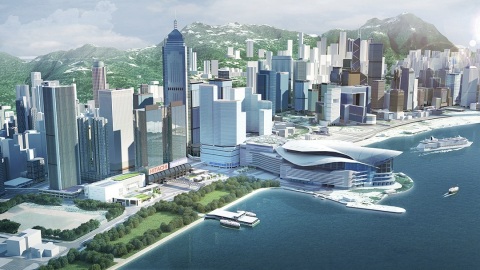MTR Shatin to Central Link in Hong Kong, Hammersmith Flyover Strengthening Phase 2 in London, and the Sixth Street Viaduct, Los Angeles take top honors for exemplary use of BIM for civil infrastructure projects
SAN RAFAEL, Calif. — (BUSINESS WIRE) — September 30, 2015 — Autodesk, Inc. (NASDAQ: ADSK) and CGarchitect, a leading online magazine and end-user community for visualization and design professionals, announced this year’s winners of the 2015 Autodesk Excellence in Infrastructure Competition to spotlight some of the world’s best applications of Building Information Modeling [BIM] for civil infrastructure projects.
This Smart News Release features multimedia. View the full release here: http://www.businesswire.com/news/home/20150930005410/en/

Arup was awarded the first place prize in the 2015 Autodesk Excellence in Infrastructure Competition for MTR Shatin to Central Link, a 17km-long railway line expansion undertaken by MTR in Kowloon and Hong Kong Island. (Photo: Arup)
In its fourth year, the Competition honors Arup, Ramboll - Parsons Brinckerhoff Joint Venture, and HNTB as the Competition’s first, second and third place winners for their transit and bridge projects. The competition also recognizes CivilE, LLC as small project award winner, and Dawn Digital Pvt. Ltd. as the visualization award winner.
“Each of the winning projects offers a model for the application of forward-thinking Building Information Modeling workflows and technologies for challenging infrastructure projects,” said Amar Hanspal, senior vice president, Autodesk. “First place Arup, for example, created a large-scale model for a section of a 17 km-long railway line that integrates GIS data from multiple sources and formats and consolidated this information with the proposed station, tunnels, public facilities and as-built records of the adjacent buildings. This remarkable effort demonstrated how the application of BIM process-based technologies and practices can help manage project scope and foster cross-disciplinary design to support design reviews, improve constructability, manage traffic and communicate more effectively with all stakeholders.”
Managed by CGarchitect, and co-sponsored by Autodesk and HP, the competition’s panel of industry expert judges selected the winners from a total of 40 submissions covering a wide range of airports; ports; bridges and tunnels; rail and transit; roads and highways; land, urban and campus; water resources; and utilities projects. The judges evaluated entries based on complexity, innovative use of technology, sustainability and the execution of a BIM process to anticipate, assess and act more confidently from project start to finish and continue to add value to operations and maintenance. The winners will be honored at the upcoming Autodesk University 2015 conference this December in Las Vegas.
First Place: Arup
Arup was awarded the first place prize for MTR Shatin to Central Link, a 17km-long railway line expansion undertaken by MTR in Kowloon and Hong Kong Island. The project involves construction of 1.8km twin railway tunnels, a new underground station with interchange facilities, as well as ventilation buildings and shafts in Wan Chai of the Hong Kong Island – one of the most built-up and busiest commercial areas in the territory.
“As one of the first movers, Arup is committed to be at the forefront of BIM development, driving BIM use to improve its positive impact across a diverse spectrum of disciplines and projects,” said Timothy Suen, Arup fellow and director of Railway in East Asia. “Using BIM in the design process is invaluable. With most works being underground and many things happening around the site, unforeseen conditions and changes are unavoidable. BIM allows us to make critical decisions using data that can be easily visualized, enabling the team to find alternatives more effectively with a clear overview of the sequence of work for this highly complex project.”
Second Place: Ramboll – Parsons Brinckerhoff Joint Venture
The second place prize was awarded to Ramboll - Parsons Brinckerhoff
Joint Venture for the
Transport
for London (TfL) Hammersmith Flyover – a 622m long example of an
early pre-cast post tensioned bridge constructed more than 50 years ago,
which was in need of significant strengthening and repair. This
prominent elevated roadway is constructed of segmental pre-cast concrete
cantilever sections and is supported by 15 central piers. While the
as-built model and concept designs were being progressed, the joint
venture undertook internal and external laser scan surveys to provide
further confidence and accuracy. Establishing a highly collaborative
cyclic process between all stakeholders included modeling the proposed
strengthening anchors and post tensioning cables, checking the design
for fit and reporting, discussing and resolving issues, and repeating
the process until the design worked. Using the laser scan, the design
model, Autodesk ReCap, Autodesk AutoCAD and Autodesk Inventor in design
workshops highlighted the greater accuracy of both the scan data and the
model which helped to inform the construction tolerance required for the
system.








